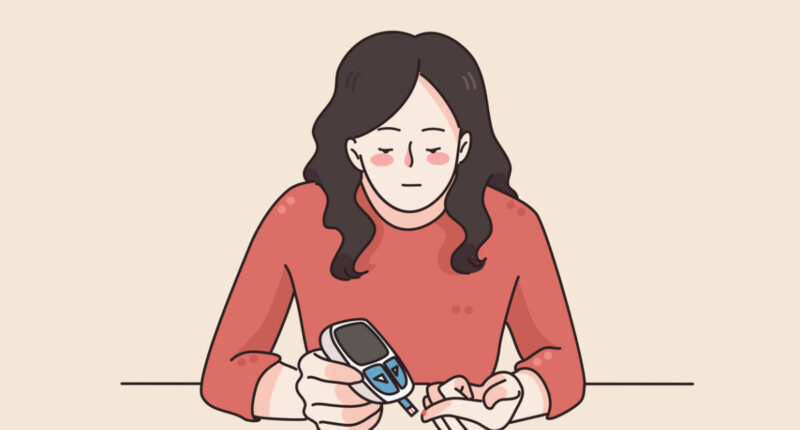Diabetes is a chronic health condition that affects millions of people worldwide. It is a disease that affects the way the body processes glucose (sugar) and can lead to a range of health complications, including heart disease, kidney disease, blindness, and nerve damage. In addition to the physical health complications associated with diabetes, there is also a growing body of evidence linking diabetes to mental health problems.
The Connection between Diabetes and Mental Health
People with diabetes are at a higher risk of developing mental health problems, such as depression and anxiety, compared to the general population. This is due to a number of factors, including the stress of managing the disease, the physical health complications that can arise as a result of diabetes, and the negative impact that poor glucose control can have on mental well-being.
Depression is a common mental health problem among people with diabetes, and is thought to affect around one in four people with the disease. Symptoms of depression can include feelings of sadness, hopelessness, and a lack of interest in activities that were once enjoyed. Depression can also make it difficult for people with diabetes to manage their condition effectively, as it can reduce motivation and increase the risk of skipping meals or not following a recommended exercise program.
Anxiety is another common mental health problem among people with diabetes, and can be caused by the stress of managing the disease, fear of developing health complications, and fear of low or high blood sugar levels. Symptoms of anxiety can include feelings of worry, restlessness, and difficulty sleeping.
The Impact of Mental Health Problems on Diabetes Management
Mental health problems can have a significant impact on diabetes management, and can increase the risk of developing health complications. For example, depression and anxiety can make it difficult for people with diabetes to follow a healthy diet, which is essential for controlling glucose levels. In addition, poor mental health can make it difficult for people with diabetes to adhere to recommended exercise programs and to manage their condition effectively.
It is also important to note that poor glucose control can have a negative impact on mental well-being, leading to a vicious cycle between diabetes and mental health. For example, high blood sugar levels can cause feelings of fatigue and irritability, which can contribute to depression and anxiety.
Treating Mental Health Problems in People with Diabetes
The good news is that mental health problems can be treated effectively in people with diabetes. The first step is to seek help from a mental health professional, such as a psychologist or psychiatrist. A mental health professional can assess symptoms and provide a diagnosis, as well as recommend an appropriate treatment plan.
Treatment options for mental health problems in people with diabetes may include therapy, such as cognitive behavioral therapy (CBT) or talk therapy, and medication, such as antidepressants. In some cases, a combination of therapy and medication may be recommended.
In addition to seeking professional help, there are also a number of self-care strategies that people with diabetes can use to improve their mental health. These may include engaging in regular physical activity, practicing stress-management techniques, such as mindfulness or yoga, and connecting with others for support and encouragement.
In conclusion, diabetes and mental health are closely linked, and it is important for people with diabetes to understand the connection between these two conditions. If you are experiencing symptoms of depression or anxiety, it is important to seek help from a mental health professional, as these conditions can be treated effectively with the right support and care.
Link between diabetes and depression

The link between diabetes and depression is well established, with numerous studies indicating that people with diabetes are at a higher risk of developing depression compared to the general population. This connection is thought to be due to a number of factors, including the stress of managing the disease, the physical health complications that can arise as a result of diabetes, and the negative impact that poor glucose control can have on mental well-being.
Depression is a common mental health problem among people with diabetes, and is thought to affect around one in four people with the disease. Symptoms of depression can include feelings of sadness, hopelessness, and a lack of interest in activities that were once enjoyed. Depression can also make it difficult for people with diabetes to manage their condition effectively, as it can reduce motivation and increase the risk of skipping meals or not following a recommended exercise program.
The impact of depression on diabetes management is significant, as poor mental health can make it difficult for people with diabetes to follow a healthy diet and adhere to recommended exercise programs. In addition, depression can increase the risk of developing health complications, such as heart disease, kidney disease, and nerve damage.
It is important for people with diabetes to understand the link between diabetes and depression and to seek help if they are experiencing symptoms of depression. Treatment options for depression in people with diabetes may include therapy, such as cognitive behavioral therapy (CBT) or talk therapy, and medication, such as antidepressants. In some cases, a combination of therapy and medication may be recommended. With the right support and care, depression can be treated effectively, allowing people with diabetes to manage their condition and improve their overall health and well-being.









